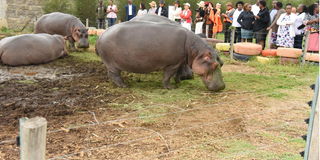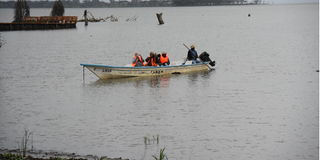The struggles of fishermen in Naivasha

Tourists watch hippos feed on the shores of Lake Naivasha on September 14, 2023.
For many people, whenever Naivasha is mentioned, the first things you think of are night clubs, safari rallies and tourism.
However, there's a huge aspect of Naivasha that is slowly getting forgotten and might soon remain a subject in our Social Studies and Geography textbooks; fishing.
While speaking to Mtaa Wangu, David Kilo, chairman of Lake Naivasha Boat Operators Association, echoes these very sentiments while highlighting challenges fishermen in the area face.

Tourists take a boat ride in Lake Naivasha on September 14, 2023.
"Although Lake Naivasha is a source of livelihood for very many families, there are a number of stumbling blocks especially for the fish business which is heavily overshadowed by tourism in the area," Mr. Kilo notes with concern.
Aside from being grateful for the attention paid by both the county and national governments to promote tourism within Naivasha, Mr. Kilo notes that the fishing industry in the town would be revolutionized if the same care and attention was given to it.
"Over the years, the government has indeed stepped in to aid the local fisherman but I still feel more can be done,” the chairman notes before adding,” if the aid is given professionally and with the right intentions it would go a long way.”
While listing the challenges local fishermen face, Mr. Kilo notes that their greatest challenge is not only illegal fishing but also overfishing.

Some of the fish from Lake Naivasha taken on September 14, 2023.
“Under the guise of supporting the local man, government officials distribute too many boats ahead of elections as a way to garner votes which in turn leads to overcrowding and overfishing,” he shares.
In the past, as a way to mitigate scarcity of fish brought about by overfishing, the government had introduced restocking, a move which Mr. Kilo notes has done more harm than good.
“While efforts to restock are admirable, the whole process should be done by professionals since in the past, we’ve had the lake restocked by common carp species and even tadpoles which are a far cry from the highly demanded tilapia.”
Other local fishermen in Naivasha also raise the main concern that is illegal fishing.
Local fisherman, Omollo* shares, “apart from the constant theft of fishing nets, there is a lot of illegal fishing that happens within the lake mostly within the cover of the night.”
Omollo* additionally notes, “Illegal fishing hurts us since in the hurry of not getting caught, everything in the water including fingerlings is taken as a catch. This not only leaves us with nothing, but is also harmful to the ecosystem.”

A view of Lake Naivasha taken on September 14, 2023.
When asked of the efforts put in to combat illegal fishing, Mr. Kilo notes, “there are indeed coast guards, members of the county fisheries team and those of the Kenya Fisheries Service that man the lake. However, given the lake's size, there's still need for more personnel.”
As a way to step in, Omollo* shares that the local fishermen have banded together to form groups that aid in the surveillance, monitoring and managing of fishing activities in the lake.
In his closing remarks, David Kilo notes that as a way to try deal with the reduction in revenue that fishing gives, Naivasha locals need to learn to diversify their source of income and reduce over-dependency on the activity.
“If done the right way, fishing in Naivasha might have a chance to overtake tourism,” David Kilo closes.
